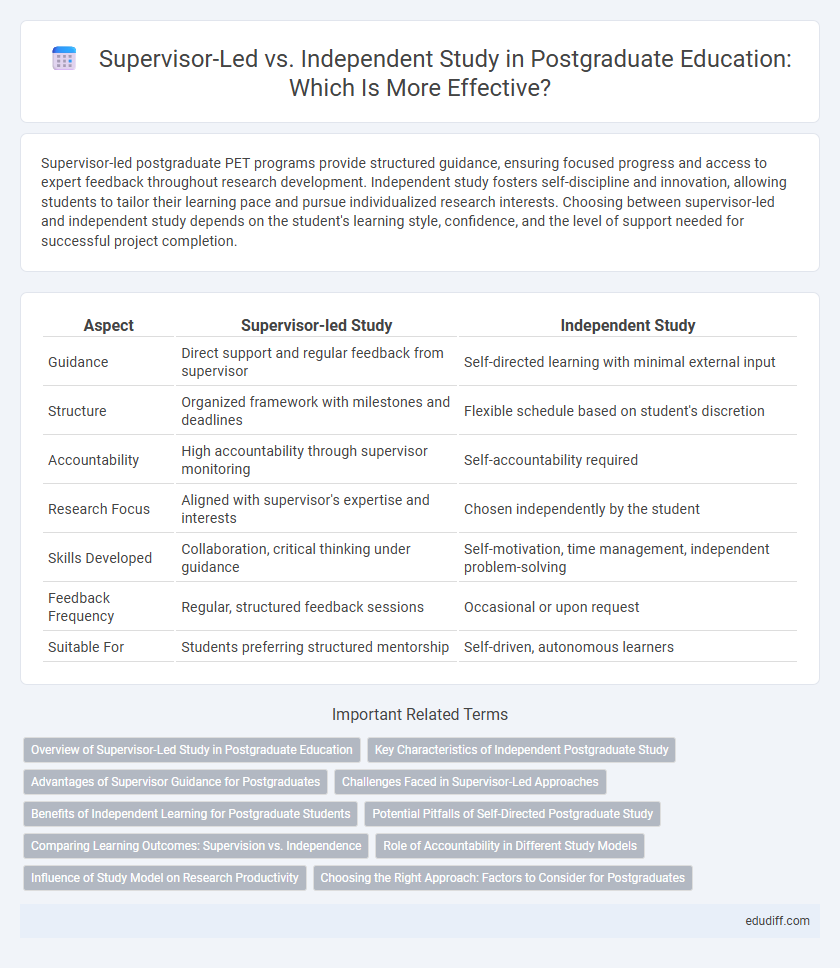Supervisor-led postgraduate PET programs provide structured guidance, ensuring focused progress and access to expert feedback throughout research development. Independent study fosters self-discipline and innovation, allowing students to tailor their learning pace and pursue individualized research interests. Choosing between supervisor-led and independent study depends on the student's learning style, confidence, and the level of support needed for successful project completion.
Table of Comparison
| Aspect | Supervisor-led Study | Independent Study |
|---|---|---|
| Guidance | Direct support and regular feedback from supervisor | Self-directed learning with minimal external input |
| Structure | Organized framework with milestones and deadlines | Flexible schedule based on student's discretion |
| Accountability | High accountability through supervisor monitoring | Self-accountability required |
| Research Focus | Aligned with supervisor's expertise and interests | Chosen independently by the student |
| Skills Developed | Collaboration, critical thinking under guidance | Self-motivation, time management, independent problem-solving |
| Feedback Frequency | Regular, structured feedback sessions | Occasional or upon request |
| Suitable For | Students preferring structured mentorship | Self-driven, autonomous learners |
Overview of Supervisor-Led Study in Postgraduate Education
Supervisor-led study in postgraduate education provides structured guidance through regular meetings, feedback, and clear research objectives, fostering academic rigor and timely progress. This approach allows students to benefit from expert knowledge, receive personalized support, and refine their methodologies under the close supervision of experienced faculty. Enhanced communication between supervisors and students ensures adherence to program requirements and facilitates professional development within the academic community.
Key Characteristics of Independent Postgraduate Study
Independent postgraduate study emphasizes self-directed research, requiring strong time management, critical thinking, and problem-solving skills. Students set their own goals and frameworks, demonstrating autonomy in designing methodologies and conducting in-depth analysis. This mode enhances intellectual independence and fosters expertise development without continuous supervisor intervention.
Advantages of Supervisor Guidance for Postgraduates
Supervisor guidance in postgraduate study provides tailored expertise that enhances the depth and quality of research by offering critical feedback and structured support. Access to a supervisor's academic network facilitates collaboration opportunities, resource availability, and professional development. Regular interaction with a knowledgeable mentor increases motivation and helps ensure adherence to research milestones and academic standards.
Challenges Faced in Supervisor-Led Approaches
Supervisor-led postgraduate study often faces challenges such as limited academic independence, where students may struggle to develop critical thinking skills due to constant guidance. Power dynamics between supervisors and students can create communication barriers, leading to misunderstandings and decreased motivation. Furthermore, inconsistent supervision quality and availability can result in delayed research progress and reduced overall student satisfaction.
Benefits of Independent Learning for Postgraduate Students
Independent learning empowers postgraduate students to develop critical thinking, problem-solving skills, and self-motivation essential for academic and professional success. This approach fosters deeper engagement with research topics and nurtures autonomy, preparing students for lifelong learning and adaptability in complex environments. Enhanced time management and personalized study strategies further contribute to maximizing the potential of independent learning at the postgraduate level.
Potential Pitfalls of Self-Directed Postgraduate Study
Self-directed postgraduate study often faces challenges such as lack of structured guidance, leading to potential gaps in critical research skills and academic rigor. Without a supervisor's feedback, students may struggle with maintaining motivation, managing time effectively, and refining their thesis focus. Inadequate oversight increases the risk of methodological errors and reduced quality in dissertation outcomes.
Comparing Learning Outcomes: Supervision vs. Independence
Supervisor-led postgraduate research often yields higher-quality outcomes through structured guidance, regular feedback, and targeted expertise, enhancing critical thinking and methodological rigor. Independent study fosters self-discipline, problem-solving skills, and intellectual autonomy, which contribute to innovative approaches and personalized learning trajectories. Empirical studies indicate that combining supervision and independence maximizes learning outcomes by balancing support with autonomy in postgraduate education.
Role of Accountability in Different Study Models
Supervisor-led postgraduate study emphasizes structured accountability through regular feedback and progress reviews, enhancing student motivation and timely completion. Independent study models rely on self-regulation and personal discipline, requiring students to set realistic goals and monitor their own progress to maintain productivity. Accountability mechanisms, whether external or internal, play a critical role in shaping outcomes and academic success in these differing study frameworks.
Influence of Study Model on Research Productivity
Supervisor-led studies in postgraduate research often result in higher productivity due to structured guidance and regular feedback, which enhance the quality and pace of academic output. Independent study promotes autonomy and creativity but may face challenges in maintaining consistent progress without direct oversight. Research indicates that a hybrid model combining supervision with independent elements can optimize research productivity by balancing guidance and self-directed inquiry.
Choosing the Right Approach: Factors to Consider for Postgraduates
Postgraduates should evaluate their learning style, availability of resources, and research goals when choosing between supervisor-led and independent study approaches. Supervisor-led study offers structured guidance and continuous feedback, ideal for complex projects requiring expert input, while independent study fosters self-discipline and creativity suited for researchers confident in managing their timelines. Balancing autonomy with access to academic mentorship enhances the quality and depth of postgraduate research outcomes.
Supervisor-led vs Independent Study Infographic

 edudiff.com
edudiff.com